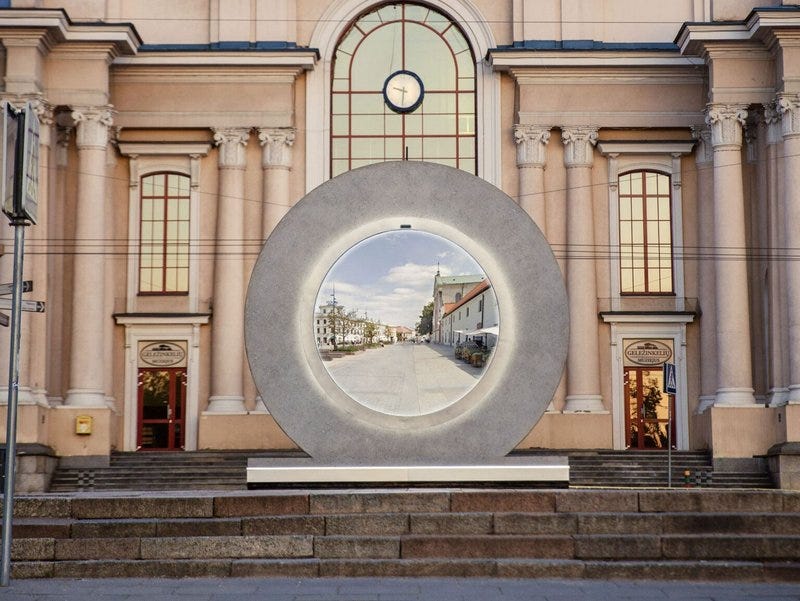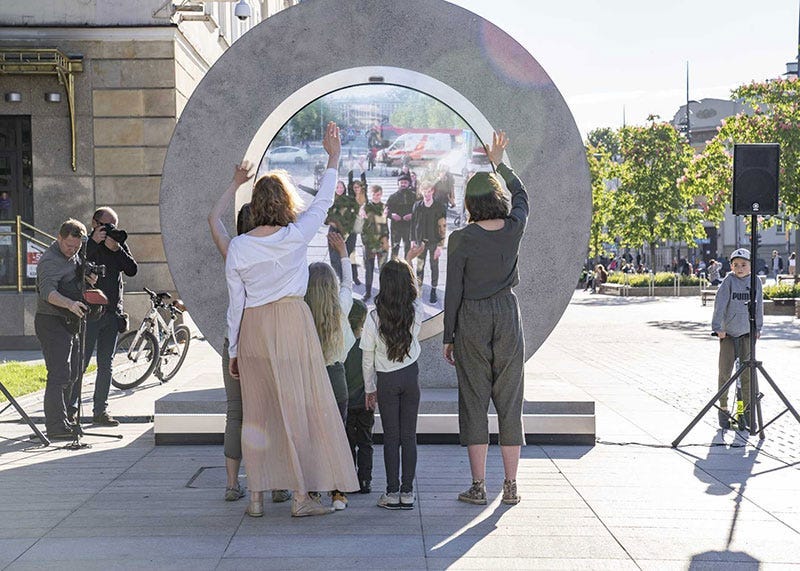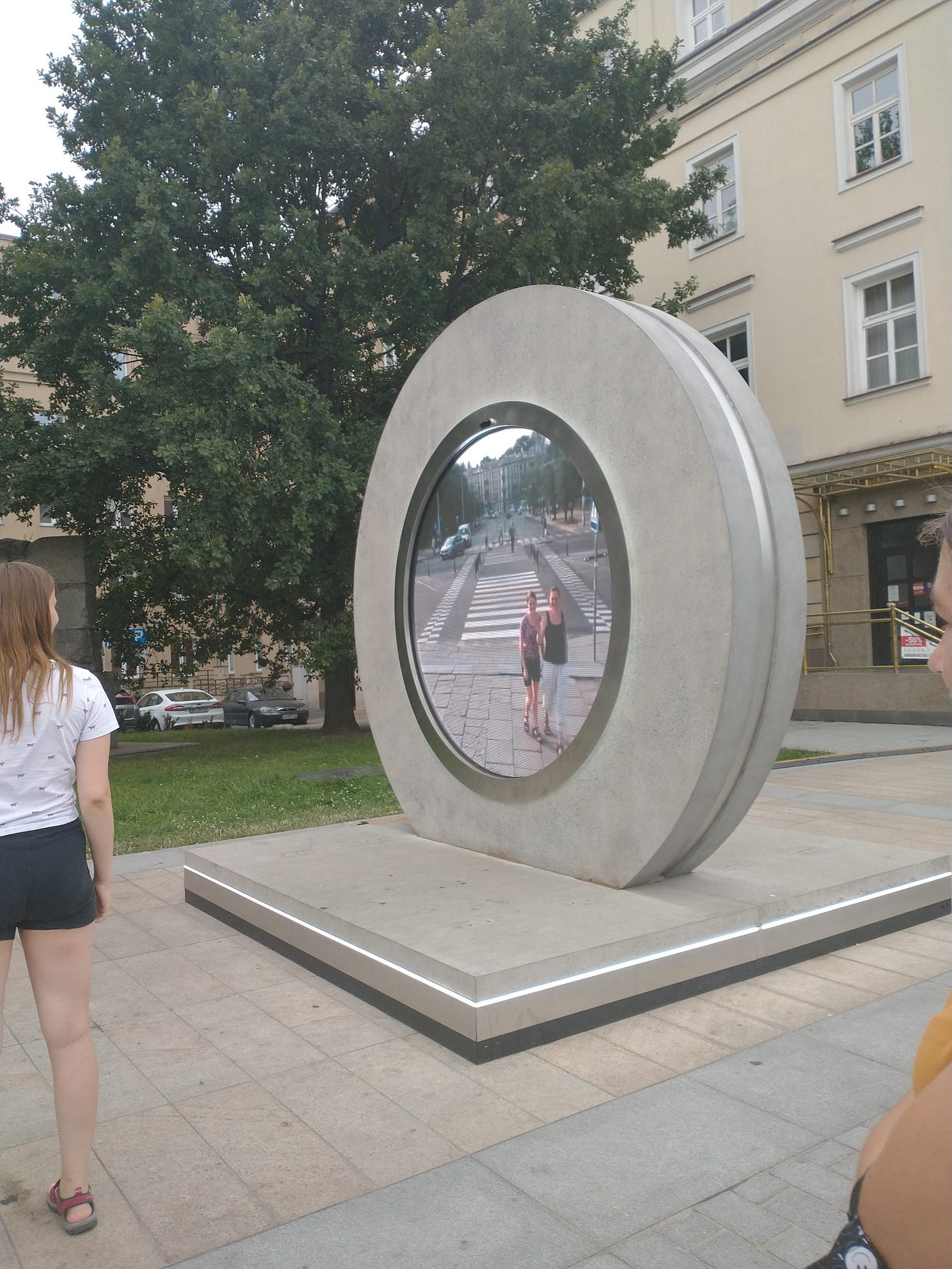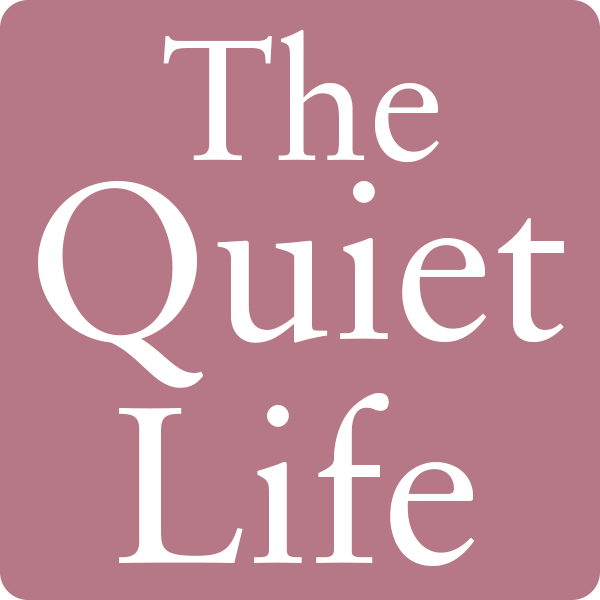It Really Is Different If We're Really There
(But we need those other ways of showing up, too.)
Hello! This is Everything Is Amazing, a newsletter about science, attention, curiosity and this weird, weird week we’re currently having.
Hope you’ve had a lovely Christmas break. While I recovering from Covid, I went onto social media to spread some Christmas cheer in the most British way I could manage, and…it went about as well as you could expect:
Okay! Onwards - and the audio piece I had planned for you before The Dreaded Virus turned my voice into white noise last week.
What would you think if you turned a corner and saw this in front of you?
TRANSCRIPT:
In the middle of 2021, the city of Vilnius in Lithuania unveiled its latest inner-city attraction: a stargate.
They didn’t call that, for fear of copyright-infringing on MGM and StudioCanal, who own the rights to that whole franchise of movies & TV shows. Nevertheless, if I say “stargate”, you instantly know what it looks like.
There are a few key differences, obviously. This stargate isn’t what physicists call a Einstein-Rosen bridge, more popularly known as a wormhole, and so it doesn’t rotate, lock onto distant coordinates and then blast out a foaming torrent of spacetime that turns into a rippling surface that can transport you anywhere in the universe if you step through it. Instead, it’s more like a window you can look through, into the alien world on the other side.
That “alien world” is the city of Lublin in Poland, around 600 kilometres or 375 miles away, where there’s an identical-looking gate that allows Lublin’s residents to look back at Vilnius. Both gates livestream the view from their twin, 24 hours a day, allowing people in each city to wave at each other, write messages on boards in that Love Actually kind of way, compare clothes or sandwiches, and so on. There’s no sound, just video - but just being able to connect with someone in another city like that, to see them and have that sense of being together in this odd semi-real shared space for this particular moment, is a hugely affecting thing.
Another big difference is that the gates aren’t relics of a long-dead race of intergalactic ancients. They’re actually designed by engineers at the Creativity and Innovation Centre at Vilnius Gediminas Technical University, in association with an entrepreneur called Benediktas Gylys and he wants to build a lot more of them in other cities around the world, so maybe one day the gate is showing a view of Barcelona, another day it’s Hong Kong, that sort of thing.
This is a really lovely idea, and it’s also exactly the sort of project where some folk - perhaps the type who wear expensive but badly-fitting suits - will say What’s the point and how can we justify the expense of this?
And then you get bogged down in trying to find rational reasons to underpin that immediate loveliness of this idea that everyone continues to enjoy, and once again the tyranny of usefulness has entered the room and it’s all about things not too distantly related to money. All very practical and tedious.
So, perhaps for this reason, they’re called artworks. If you call it Art, you can, in theory, subvert the conversation around this narrow, functional definition of value. But I think they’re also a good practical metaphor for the way that communicating just using the internet can so often fall short.
A study from earlier this year, published in the journal Imaging Neuroscience, looked at the behaviour of 14 pairs of people placed opposite each other in two situations: one where they’re separated by a pane of glass, and one when they’re livestreaming using screens. They weren’t doing anything in particular - they were just sat there, watching each other for a few minutes, while their eye movements, pupil size, electrical activity in the brain and brain blood flow were being recorded, using electroencephalography and functional near-infrared spectroscopy. And in nearly every case, the study’s authors noticed a big difference. In person, the participants looked at each other a lot more - and in the virtual setting, they looked more distracted. In person, their pupils were more dilated - this is a broad indicator of social arousal and emotional engagement. And in most cases, the electrical activity and blood flow in their brains during the in-person sessions suggested higher levels of activity in areas related to visual attention, facial processing and visual stimulation.
This suggests a scientific basis for something it’s very easy to feel when you’re having a virtual conversation versus an in-person one: we pay less attention when we talk to each other online, we tune out more, and we feel less of a connection to the person we’re talking to.
Another study also from earlier this year proposes it’s even worse than that. When we’re deep in conversation with someone, we appear to have a tendency to synchronize the frequency of the electrical rhythms in our brains - this came out of studies performed by Guillaume Dumas of the Universite de Montreal, and a further study he helped run this year involved 62 pairs of mothers and their children, where the kids were aged between 10 and 14 years old. In almost all cases, the data showed a dampening of this synchronizing in virtual conversations compared to real-life ones. This is serious stuff, believes Dumas, as this syncing of brainwaves is associated with the process of teaching the difference between the self and others - including, presumably, the teachable skills of empathy.
This same study also showed less instances of cross-brain activity - where the conversation stimulated different regions of the frontal and temporal parts of the brain to work together. Virtual conversations seem to make fewer demands on the brain, as measured in this way.
So - what, is the science saying that Zoom and remote working and our phones are making us terrible people? You can imagine a hundred headlines spun out from these studies, all of them missing the point. Of course we shouldn’t chuck away virtual conversations, even if we could, which we can’t. The story of journalist Paul Miller who quit the internet for a year in 2012 is worth looking at here - what he found is an aching loneliness and endless distance from all his friends, because even though in-person conversations may be richer and more engaging, they’re impossible to have when you’re not in the same geographical place, which almost all of us aren’t.
As a teenage nerd who grew up to become…an older teenage nerd, one of the most fun things I’ve discovered about myself as an adult is that I’m an introvert who really likes people. I never knew this could be a thing until I read Susan Cain’s “Quiet: The Power Of Introverts In A World That Can’t Stop Talking”.
Susan has also just arrived on Substack, so I recommend you go have a read:
(Susan, a warm welcome to all this lovely madness.)
At the start of the pandemic in 2020, when the first lockdowns struck here in Scotland, I was living by myself in a rented wooden cabin, mourning the loss of what I was laughingly regarding as my career as a travel writer, and wondering if my half-baked plan to start a science newsletter on curiosity and wonder would really amount to anything. I was also hardly seeing anyone for days at a time, and probably increasingly in danger of going a bit strange.
So I started playing with this new thing called Zoom that everyone was banging on about. I’d been on a few group calls that felt as chaotic as trying to have a conversation at a noisy pub, and I knew I didn’t want that, so I roped a few friends into one-to-one calls - no particular reason, just talking for the hell of it, to see what happened. Then a friend suggested I chat to one of his friends, someone I didn’t know - and that ended up being fun too.
So then I just posted the link to all my social media channels so anyone could book a semi-pointless call with me. This turned into around a hundred conversations, the majority of which were with total strangers, and that was an unexpected joy. Honestly. If someone had formerly suggested this idea to me, I’d have been riddled with fear about being trapped on calls with total lunatics - but because it was my idea, and because as a travel writer I was used to inventing exciting and hopefully profitable new ways to scare and humiliate myself in the service of a good story, I plucked up enough courage to try it.
And it worked! Brilliantly. Three months of feeling the most social I’d been in years - all while hiding from the world in a glorified Scottish shed. Very odd, very modern.
Looking back, I think that’s how I got the confidence to start this newsletter in early 2021. There are, right now some percentage of 22,000 of you reading or listening to this, and my introvert side, which longs to accidentally get locked in a library over the holidays with a rucksack full of sandwiches and biscuits, is never going to stop shrieking in fear about this. But the more of you I actually talk to, using that noise-making or cake-eating part of my face, the more I’ve become reassured that you are on the whole quite nice and absolutely fascinating to talk to. Why wouldn’t I want to say hello with my newsletter?
But those Zoom calls - and the ones I’ve had with some of you since then, including just before Christmas - constantly remind me of the limitations of writing this newsletter in the way I do. That’s another reason I like doing these audio versions - it’s another layer of humanning my way to having a better connection to you. And it also lets you consume my newsletter while you wash the dishes, or take the dog for a walk. That’s a win for both of us.
But it is really great that I can reach you at all, and for that I really have to thank all the imperfect, watered-down digital forms of communication that it’s currently fashionable to bash in public for what they’re doing to our ability to pay attention and get along.
Social media, in particular - that’s how quite a few of you found me. I certainly wouldn’t want to chat for very long on social media, because that’s not really what it’s for. It’s a place for fleeting empathic curiosity - ooh, that looks like an interesting person, I’ll subscribe to whatever their thing is elsewhere, or hey that’s an interesting point, I’d better go do some actual reading on that. Social media is incredible for that, and yet fairly rubbish for a lot of other things, so if that’s how you found me, I’m so glad you’re here, where you can have a much richer, deeper and more fulfilling experience of disagreeing with me and calling me an idiot.
But I remain grateful to social media, not dismissive of it - because there’s a good chance I couldn’t have got your attention in person. Isn’t it amazing that I’m here, in a small cold town in Western Scotland, and you’re there in - I’ll pause for a second, say out loud where you are in the world, ready? Now - okay, and we’re having this moment together, me droning on and on, and you half-listening with the dog or the dishes. Or maybe we’ll go on to have one of these curiosity calls I’ve been doing recently with paid subscribers in exactly the same way as I did those Zoom calls in 2020, where we just chat about anything or nothing for 30 or 40 minutes, being people in that convincingly people-like way that so rarely happens on social media. Or maybe we’ve had one already, in which case, hey, that was fun and frankly, I wish I was listening to your newsletter.
But get this: if you were born before 1990, you won’t believe how we used to have Zoom calls back in the old days. I’m not talking about telephones, which were like WhatsApp except you could talk over each other. No. What we did was, you took a tree - I know this sounds crazy - and then you sliced it really thin, and then you wrote on it. Then you put that piece of tree in another piece of tree called an envelope, and you posted it, and weeks later the other person would sit down and open it and read it, and if they wanted to respond, more weeks would have to pass before you read that reply. Hopelessly inefficient, but wow, it felt special at the time. When you were that constrained and it took that long, you really had to think about what you were writing. No room to mess around.
But, says my gone-feral-in-a-library introvert, none of those things can hold a torch up to the experience of sitting with someone’s thoughts and arguments at the length of a book, that sustained immersion in the output of someone else’s mind and worldview that can be so rewarding, and take so much time, and yet be so much fun. I mean, right there is surely an argument for modern science giving us lifespans of a thousand years or more - the things you could really, properly learn. You could even re-read things.
(I want to say, “hey, that would allow me to catch up!” but, well - I’m not that naive.)
So yes: mutely peering into each other’s eyes through stargates is both a wonderful idea and decidedly not a perfect way of communicating. But that’s because nothing in communication is perfect - and nothing is uniquely terrible, either. I’d much prefer to see all these new tools as parts of a balanced communication diet, perhaps with social media as the sugar that if you overdo it can send you a bit hyper, keep you up all night and leave you a puddle of anxiety the next day. (This was exactly my experience of going viral on Twitter, and it took me months to recover from it.)
But it feels really important to me that at some point, we try to find a way to actually see each other, just to be reminded that we’re all human beings out here, ridiculous and insecure and weary and hopeful and curious, in exactly the same way as that face we see in the mirror every day. I hope we can keep looking for new ways to make that happen.
Thanks for listening.
Images: Portals.org; BBC News; Melissa-Anna.







thanks so much for the warm welcome, Mike!
I'm with Elle. https://www.elysian.press/p/substack-writers-for-community-moderation
I subscribe to (too) many Substack newsletters, including many on both sides of this issue. I think Elle is reasonable. I don't trust the "everyone I don't like is a Nazi" mindset not to creep in. While I have found the minefield that political discourse has become over the past 8ish years or so as disturbing as the next person, I've come to believe that we suffer from silo-ing off ourselves, and that shunning and mocking those we disagree with is not the model for a healthy society. (The comment from Overtheblues says it better).